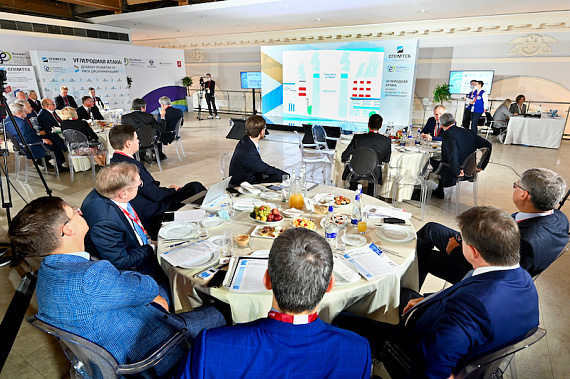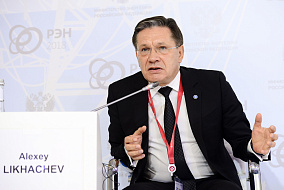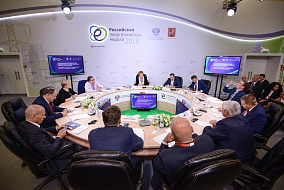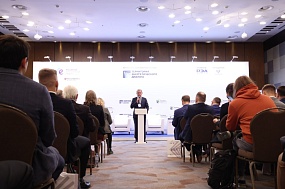Experts: Russia needs its own carbon regulation system

Russia has every opportunity to create an ambitious national carbon regulation system, given the absorptive capacity of its forests and the existence of institutions that are able to engage effectively with representatives of different economic sectors. The majority of experts at the business breakfast on ‘Carbon Attack: Development Driver vs Risk of Discrimination?’ as part of Russian Energy Week 2021 agreed that any such system should incentivize businesses to reduce emissions and introduce new technologies, while reducing payments under the Carbon Border Adjustment Mechanism (CBAM) for Russian companies.
CONCLUSIONS
“In view of this, I would like to note that the issue was raised very recently at the Federation Council and we came to the conclusion that there is no perfect energy source, that each one possesses a particular combination of strengths and weaknesses. At the same time, green energy today (including hydrogen energy) has a similar political status within the energy transition to that of nuclear energy in the 1970s. The artificial acceleration of the energy transition, a radical reduction in investment in the existing energy system, and the sweeping changes in public opinion with regard to the apparent exhaustion of hydrocarbon reserves could create a hydrocarbon shortage within the next 3–5 years and pose a serious threat to the stability of the global economy,” Member of the Committee of the Federation Council of the Federal Assembly of the Russian Federation on Agriculture and Food Policy and Environmental Management Gennadiy Ordenov.
“The initiative put forward at today’s event to establish Russia as an active participant in forming international environmental policy has our full support. We must first of all address the issues regarding certification and standardization in order to meet all the criteria for international carbon unit standards and participate in the international carbon asset market. The system should of course be designed in a way that incentivizes Russian companies to reduce their carbon footprints, and we must synchronize the regulatory and legal framework for national standards on reporting and verifying emissions with international standards,” General Director of SDS-Ugol Gennady Alekseev.
“As we understand it, the global changes now taking place all over the world and in our country really will bring about fundamental changes to the traditional economy. We can see even from the title of this session that the changes taking place pose a threat of sorts to the traditional economy as it exists today. On the other hand, we realize that a major new market is being born. We are talking about the market for carbon certificates and quotas, and the carbon market in general,” member of the Supervisory Board of GreenEco Investments Igor Kolesnikov.
PROBLEMS
“A study conducted at Skolkovo showed that in the future every single company in all economic sectors will be affected in one way or another by the CBAM. There are risks that will arise as a result of this, firstly affecting exporters and then spreading through the economy. These risks concern all shareholders and all aspects of company life,” Co-Chairman of the Committee of the Association of Independent Directors on ESG Andrey Trapeznikov.
“Unfortunately, our assessment is that we have been lagging well behind in the adoption of laws and regulations. Moreover, we are not only lagging behind the leading global players, but also the plans approved by the Russian government. Today, now that attempts are being made to move quickly and make up for lost time in recent years, it seems that a great deal is being rushed and the views of experts who have been working on this issue for many years are not always being taken into account,” Vice President of the Chamber of Commerce and Industry of the Russian Federation Dmitry Kurochkin.
“The issue is that there are several points of contention still to be resolved. First of all, there is no mechanism for distributing quotas, though this will apparently go through the regions. In fact, there is no coherent system for assessing and monitoring CO2 emissions either. We have virtual calculations based on the volumes of different types of energy we are consuming, but these calculations are taken from international sources. We are using estimates of the amount of CO2 we are emitting and how much is absorbed by our forests and swamps. No one knows the real figures,” Chief Economist at VEB.RF Andrey Klepach, addressing the participants of the business breakfast via video link.
SOLUTIONS
Increasing the country’s absorptive capacity through the creation of carbon landfills or farms.
“One important area is the launch of so-called carbon landfills, with one currently in operation, or carbon farms where trees that intensively absorb CO2 can be grown in future,” Chief Economist at VEB.RF Andrey Klepach.
The creation of a unified carbon regulation system with appropriate sanctions and incentives should be implemented in a gradual and balanced fashion.
“The energy transition should be based on the stability of the existing energy system, with a dramatic decrease in the share of hydrocarbons in the energy mix. The share of non-fossil fuel energy should increase gradually over time, as the technology is ready. We must therefore make serious revisions to the best available technology handbook and put the conditions in place for the transition of production processes to the best available technologies. The potential risks stemming from cross-border carbon regulation on the part of the European Union should be resolved through the development of our own climate agenda,” Member of the Committee of the Federation Council of the Federal Assembly of the Russian Federation on Agriculture and Food Policy and Environmental Management Gennadiy Ordenov.
The carbon regulation system should be based on the work of institutions that already function effectively in Russia and are internationally respected.
“Not everybody realizes that soon, in the near future, these discriminatory measures will be taken not against specific companies or types of products but countries that, in the view of the European population, are not devoting sufficient attention to the carbon agenda. This is an area in which we could hold dialogue on equal terms, since we are equal parties to a number of systems, including European institutions and chambers of commerce and industry, and we are working actively on this alongside our European partners,” Vice President of the Chamber of Commerce and Industry of the Russian Federation Dmitry Kurochkin.
The St. Petersburg International Mercantile Exchange (SPIMEX), one of the supporters of the event, volunteered to become a registrar for carbon units under the proposed system. The moderator of the business breakfast, SPIMEX President Alexey Rybnikov, said that it would be impossible to reduce the payments made by Russian companies on cross-border taxes and calculate allowances without setting prices and putting quotas into circulation on the open market.
The Russian Energy Week International Forum took place in Moscow from 13 to 15 October. The organizers are the Roscongress Foundation, the Ministry of Energy of the Russian Federation and the Moscow City Government.





